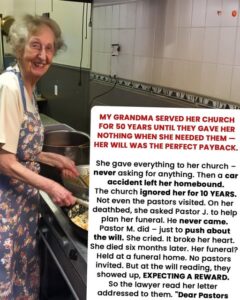Families were speaking, trays were moving across counters, and fryers were beeping in the background on this typical busy evening at the restaurant. However, I stopped when I observed something.
An old man in a wheelchair was kneeling next to a young employee who had moved away from the counter. I initially believed they were only conversing. Then I watched the worker, with steady hands and calm focus, meticulously chopping up the man’s food.
He wasn’t in a hurry. He didn’t do anything to get attention. He was only lending a hand.
With his weak hands lying on the table, the elderly guy smiled gently. “I’m grateful, son,” he whispered.
The worker completed his duties with a simple nod. However, the elderly man mumbled something else as he got up, and it was so softly that I nearly missed it.
And my heart tightened as I heard it at last. “You make me think of Thomas, my grandson. This is how he always assisted me.
The young employee who had “Caleb” written on his nametag hesitated. His voice was soft as he said, “I’m glad I could help, sir.” Then, with a new lightness in his motions, he made his way back to the counter with the same efficiency.
I kept thinking about Caleb kneeling in the busy restaurant, his generosity shining brightly. As a former educator, I’ve had a lot of experience with young people. Rarely can you witness such true compassion in a simple deed; some people are driven, while others are lost.
I ended up back at the fast-food place the following day. I was curious as to whether Caleb’s generosity was a one-time occurrence or a characteristic of his personality. I sat close to the counter and watched while ordering a small coffee.
Caleb was occupied with clearing tables, bagging food, and collecting orders. But his smile never wavered, and he never lost his tolerance. He showed respect to everyone, even the agitated parents and boisterous youngsters.
Then a young mother arrived with a tantrum-throwing kid. The toddler refused to sit in the highchair and was kicking and screaming. The mother’s face was flushed with shame, and she appeared worn out.
Caleb came over to them, smiling softly rather than in displeasure. He took a little, colorful napkin out of his pocket, bent down to the toddler’s level, and began folding it into a paper airplane.
As he watched Caleb’s hands move, the child’s cries stopped and his eyes widened. The youngster laughed, forgetting his outburst, as Caleb gave him the airplane. Relief-filled tears welled up in the mother’s eyes.
“I’m grateful,” she muttered. “You don’t realize the significance of that.”
Caleb smiled warmly and added, “It’s no problem, ma’am.” “A small paper airplane.”
At that moment, I realized Caleb’s generosity wasn’t a façade. It was in his character. He observed people, recognized their needs, and offered assistance where he could.
I started going to the restaurant on a frequent basis throughout the following few weeks. I would watch Caleb work while enjoying my coffee in the corner. He worked part-time to pay for his college tuition while he was a student, I found out. He once told me that he wanted to help individuals who were struggling, so he was learning to be a social worker.
I once witnessed a gang of kids harassing a lone young man seated at a table. They were mocking his attire, his stutter, and his reserved manner.
When Caleb realized what was going on, he acted without hesitation. His voice was forceful but calm as he approached the table. He said, “Hey, guys.” “How about moving your chat to another location? This gentleman is uncomfortable because of you.
Startled by his intervention, the adolescents complained and walked away. With thankful eyes, the young man at the table glanced up at Caleb.
“I’m grateful,” he stumbled. “That is something they do a lot.”
“Avoid letting them affect you,” Caleb said. “You are more valuable than what they say.”
Finding out that Caleb was having difficulties himself was the twist. He was working hard hours to make ends meet, his mother was sick, and his tuition was due. However, he never grumbled or allowed his personal issues to override his empathy for other people.
I was seated at my normal table one afternoon when I noticed Caleb conversing with a man wearing a suit. The man appeared serious and held a clipboard. Caleb’s countenance brightened after a few minutes, and he shook the man’s hand.
I later questioned Caleb about the topic of the chat. He informed me that the man was being watched by a local charity. They wanted to give him a scholarship to complete his education because they were moved by his generosity and commitment to serving others.
Caleb’s voice was full with emotion as he said, “I couldn’t believe it.” “I was really concerned about how I was going to pay for school, but now that I don’t have to, I can relax.”
I grinned. “Caleb, you deserve it,” I said. “You deserve it.”
Caleb’s story serves as a reminder of the importance of kindness. It has the power to change someone’s day, their life, and even yours. It serves as a reminder that we may find the fortitude to assist others even when we are going through difficult times ourselves.
Attending a small community gathering a few years later was the satisfying climax. Now a certified social worker, Caleb was present. He was speaking about the value of compassion and empathy. He talked about his encounters at the fast-food restaurant, the people he assisted, and the reciprocal generosity he experienced.
His eyes gleamed as he gazed out at the crowd. He remarked, “I discovered that being kind is more than just performing good deeds.” Seeing the humanity in everyone, even at their darkest moments, is the key. It’s about lending a helping hand, a sympathetic ear, or a moment of insight.
Everyone in the room agreed with what he said. Everybody has known someone like Caleb, someone whose small deeds of compassion have changed our lives.
The lesson in life is that kindness has a cascading impact. Numerous lives might be impacted by a single, modest deed. One individual at a time, this strong force has the ability to transform the entire planet.
Please tell others about Caleb’s experience if it has motivated you. Let’s spread the word about compassion and kindness. Additionally, let someone know if their kindness has touched you. A simple “thank you” can have a profound impact.




